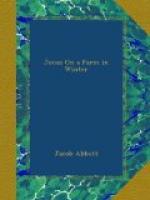Franco jumped out of its way. The stick rolled along the road before him. He sprang forward to it, seized it in his mouth, and came trotting back to the farmer’s wife, and laid it down at her feet; and then, standing back a few steps, he looked up into her face, with a very earnest expression of countenance, which seemed to say,—
“What do you want me to do next?”
This very act of Franco’s embarrassed the woman considerably. She could not bear to take up the very stick, which Franco had himself brought to her, and throw it at him again; and, on the other hand, she could not bear to give up, and let Franco remain. She, however, picked up the stick, and brandished it again towards Franco, and, stamping with her foot at him, she said,—
“Away with you, dog; get home!”
What the result of this contest would have been, it is very difficult to say, had it not been that it was soon decided by the occurrence of a singular incident; for, as the farmer’s wife nodded her head, and stamped at the dog, the jar or the motion seemed to give the wind a momentary advantage over her bonnet, which, in her haste, she had not tied on very securely. A strong gust carried it clear from her head, and blew it away over Franco, upon the snow by the side of the road beyond. Franco, who was all ready for a spring, bounded after it, and pursued it at full speed. The snow was nearly level with the top of the stone walls, and the wind carrying it diagonally from the road, it rolled over the little ridge of stones which remained above the drifts, and then swept across the field, down a long descent, like a feather before the gale.
Franco pursued it with flying leaps over the snow, which had become sufficiently consolidated to support his steps. He gained upon it rapidly, and at length overtook and seized it; and then, turning round, he trotted swiftly back, leaped over the top of the wall, and brought the bonnet, and laid it down at its owner’s feet, with an air of great satisfaction.
The good woman took up her bonnet, and threw her stick away, and, turning around, walked back to the house. The farmer, who had been looking out at the window, was laughing heartily. She herself smiled as she returned to her work, saying,—
“The dog has something in him, I acknowledge; go and see if you can’t find him a bone, Jonas.” “Yes, Jonas,” said the farmer, “you may have him for your dog till the owner comes and claims him.”
And this is the way that Jonas first got his dog Franco. He told Oliver that morning, as he was patting his head under the old General’s crib, that the dog had taught them one good lesson.
“What is it?” asked Oliver.
“Why, that the Christian duty of returning good for evil, is good policy as well as good morals.”
[Illustration]
CHAPTER IV.
DOG LOST




